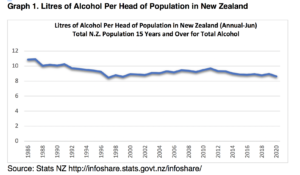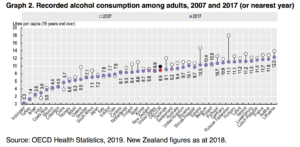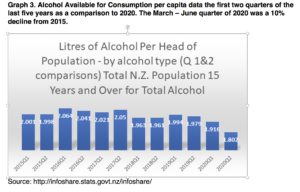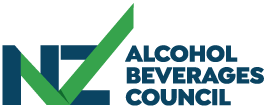MEDIA RELEASE 20 November 2020
NZ Alcohol Beverages Council says a just-released Ministry of Health (MOH) survey [1] on the state of New Zealanders’ overall health patterns has missed the opportunity to measure the impact of COVID-19 – and the next survey will also likely not reflect this.
“Although the 2019/20 survey provides some useful insights, it’s unfortunate that it has been published as part of the regular trend data, as it is not a representative of some of the positive changes we saw in people’s relationship with alcohol over lockdown,” says Bridget MacDonald, NZABC’s Executive Director.
The survey acknowledges that constraints arising from the pandemic mean the 2019/20 results are based on fewer participant interviews than in previous years and the data collected until March 2020 does not include information about people’s health during the lockdown in New Zealand.
Global research undertaken by the International Alliance for Responsible Drinking (IARD) revealed the vast majority of people (84%) consumed the same amount or less alcohol during COVID-19 lockdowns. The survey of more than 11,000 people across nine countries, including New Zealand, found almost one in three people (30%) said they were drinking less or stopped drinking, and of those nearly half (46%) said they would continue to drink less when the restrictions were eased.
These results echo the findings of research undertaken by New Zealand’s Health Promotion Agency (HPA) during and post-lockdown (which is the period the latest MOH survey excludes). The HPA research showed under the pressures of lockdown 36% of New Zealanders didn’t drink at all, and one-third of people were drinking less.[2]
It was hoped these behaviours would continue after lockdown, and follow-up research shows there have been some positive changes with almost a quarter (22%) of Kiwis reported they are still drinking less than usual. [3] Economic reasons accounted for 33% of people drinking less, but 24% said it was to be healthier, and 23% to use the opportunity to reduce how much they were drinking. The proportion of ‘everyday’ drinkers decreased from 19%during lockdown down to 11% post-lockdown – especially those aged 25-49 (from 14% to 7%), and 50-64 years (from 23% to 9%).
The Ministry of Health survey shows younger adults are following global trends of drinking less and less hazardously. In young people aged 18-24 years, drinking has declined 3.9% from 89.1% in 2006/7 to 85.4% in 2019/20, and the 25-34 year group has seen drinking decline 2.9%. The survey first collected data on those who had drank hazardously in the past year in 2015/16. Since then, there have been decreases seen in people aged 18-24 years by -6.5%; 25-34 years by -4%; and 35-44 years by -2.3%.
“We know 80% of New Zealanders who drink alcohol are doing so in a responsible way. We are generally seeing positive downward trends in our drinking and a culture shift in attitudes and behaviours – we’re seeing less hazardous drinking and fewer younger people are drinking, and our consumption is below the OECD average. Younger adults have generally been leading the charge in changing attitudes and behaviours toward alcohol – but older adults also seem to be making better decisions around alcohol based on their personal circumstances, situation and their lifestyle,” says Bridget.
“There remains more work to be done to reduce harmful drinking. Alcohol is an adult beverage to be enjoyed as part of a balanced lifestyle. But, we need to be honest about what, how and why we drink. If alcohol is misused or abused, then harm can happen. Ministry of Health research shows that one in five drink in a way that is harmful to themselves or others – and that is not okay,” she says.
“Targeted education and support programmes are vital to helping people understand how alcohol can affect them and to give them the information, tools and support they need to make better decisions. Two-thirds of New Zealanders support this approach to reducing harmful drinking.[4]
“It’s important to acknowledge the positive attitudinal and behavioural changes to alcohol we are making, but we also need a collective ‘all-of-society’ effort to accelerate the positive changes and to reduce harm – and 84% of Kiwis support the idea of local and central government, health and education providers, communities and individuals and the alcohol industry finding ways to work together and play their part,” says Bridget.
ENDS
Need help?
Call the Alcohol Drug Helpline on 0800 787 797, free txt 8681, or visit alcoholdrughelp.org.nz.
Need more information?
Check out cheers.org.nz and alcoholandme.org.nz for more information on what a standard drink is and how to make better drinking decisions.
Ministry of Health/HPA Guidelines: Low-risk alcohol drinking advice:
Reduce your long-term health risks by drinking no more than:
– two standard drinks a day for women and no more than ten standard drinks a week,
– three standard drinks a day for men and no more than 15 standard drinks a week,
– AND have at least two alcohol-free days every week.
About NZABC
Formed in early 2018, the NZ Alcohol Beverages Council (NZABC) is a pan-industry group that speaks for those Kiwis who want to see a fair and balanced approach to alcohol attitudes, laws and regulation in New Zealand. At NZABC, we believe partnerships between local and central government, communities, and the alcohol sector, along with great education, are the best ways to reduce harm and maximise enjoyment from alcohol for everyone.
About IARD (www.iard.org)
International Alliance for Responsible Drinking (IARD) is a not-for-profit organisation dedicated to reducing harmful drinking. It is supported by leading global beer, wine, and spirits producers, who have come together to be part of the solution in combating the harmful use of alcohol. NZABC is a member of IARD.
References
[1] New Zealand Health Survey 2019/20, November 2020, https://www.health.govt.nz/publication/annual-update-key-results-2019-20-new-zealand-health-survey
[2] Health Promotion Agency, Post-lockdown survey – the impact on health risk behaviours, 28 July 2020 https://www.hpa.org.nz/research-library/research-publications/post-lockdown-survey-the-impact-on-health-risk-behaviours
[3] Health Promotion Agency, The impact of lockdown on health risk behaviour, 21 Apr 2020, https://www.hpa.org.nz/research-library/research-publications/the-impact-of-lockdown-on-health-risk-behaviours
[4] New Zealander’s attitudes to alcohol research (2019) Industry research shows84% agree we need an all of society approach to reduce alcohol-related harm and 80% support education programmes in schools.



